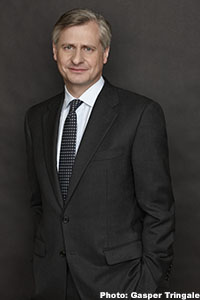The Measure of a Man
Jon Meacham traces the political roots of George H. W. Bush
Sandwiched between the presidencies of the polarizing and charismatic figures of Ronald Reagan and Bill Clinton, George H.W. Bush’s administration has already been largely forgotten by the American people. Distrusted by liberals who saw him as Reagan’s lap dog and by conservatives who thought him too soft, Bush has been viewed as a mere placeholder, a genial but inconsequential president. Those who think so are wrong. As has already happened with Dwight Eisenhower, the forty-first president is undergoing a favorable reappraisal by historians, winning high praise even from liberals like Barack Obama. In a new biography, Destiny and Power: The American Odyssey of George Herbert Walker Bush, Jon Meacham adds his Pulitzer Prize-winning voice to this reassessment, explaining how Bush’s aristocratic roots in New England forged a man almost perfectly suited to maneuver his nation through some of the most consequential events in its history.
 As a son of Prescott and Dorothy Bush, writes Meacham, George “was a child of one generation’s ruling class, the head of another, and the father of a third.” But his mother pushed her children to be active, educated, and compassionate, just as she was. There was no wallowing in inherited privilege in her home, and aristocratic airs were forbidden. Among her five children, George stood out as being both intense and empathetic, a boy with a mile-wide competitive streak that was tempered by a compulsion to consider others. He became known among family and friends as “have half” because he would share half of whatever he had with whoever was near. The desire to win, combined with an ability to see things from the other guy’s perspective, was to become the hallmark of the Bush style in politics and diplomacy.
As a son of Prescott and Dorothy Bush, writes Meacham, George “was a child of one generation’s ruling class, the head of another, and the father of a third.” But his mother pushed her children to be active, educated, and compassionate, just as she was. There was no wallowing in inherited privilege in her home, and aristocratic airs were forbidden. Among her five children, George stood out as being both intense and empathetic, a boy with a mile-wide competitive streak that was tempered by a compulsion to consider others. He became known among family and friends as “have half” because he would share half of whatever he had with whoever was near. The desire to win, combined with an ability to see things from the other guy’s perspective, was to become the hallmark of the Bush style in politics and diplomacy.
Meacham—a Chattanooga native and Nashville resident whose earlier books have examined the lives of Andrew Jackson, Thomas Jefferson, and Franklin Roosevelt—makes no secret of his admiration for Bush: “[T]he nation was fortunate that George H. W. Bush was in power when the crises of his time came, for his essential character, his experience, and his temperament armed him well to bring the decades long Cold War to an end, to confront the aggression of an irrational dictator, and to lead the nation toward fiscal responsibility.” But Meacham is also critical of Bush’s inability to communicate with the public, his willingness to compromise his own economic principles to serve Reagan, and his irresponsible campaign promises like the infamous exhortation, “Read my lips.” Meacham traces these failings, like Bush’s many successes, to his parents, whose world view required victory in contests but allowed no public expressions of emotion.
 It has often been noted that Bush had one of the most impressive resumes of any American president: combat pilot in WWII, Phi Beta Kappa economics major, businessman, congressman, ambassador to the United Nations, chairman of the Republican National Committee, envoy to China, director of the Central Intelligence Agency, and vice president. Meacham argues that there was never anyone better trained to be commander-in-chief. And none of those jobs was easy. Bush dealt directly with some of the most difficult situations of all time—making diplomatic overtures to China, urging President Nixon to resign, picking up the pieces at a broken CIA—and any one of them could have ended his career. He persevered and was rewarded with the ultimate prize, only to face as president one of the most tense, dangerous moments in history.
It has often been noted that Bush had one of the most impressive resumes of any American president: combat pilot in WWII, Phi Beta Kappa economics major, businessman, congressman, ambassador to the United Nations, chairman of the Republican National Committee, envoy to China, director of the Central Intelligence Agency, and vice president. Meacham argues that there was never anyone better trained to be commander-in-chief. And none of those jobs was easy. Bush dealt directly with some of the most difficult situations of all time—making diplomatic overtures to China, urging President Nixon to resign, picking up the pieces at a broken CIA—and any one of them could have ended his career. He persevered and was rewarded with the ultimate prize, only to face as president one of the most tense, dangerous moments in history.
Meacham heaps praise on Bush for his handling of the final act in the decades-long struggle between the West and the Soviet Union. Bush led the low-key, restrained response of the U.S. and her allies, an approach, Meacham writes, which “brought the Cold War to a peaceful conclusion, successfully managing the fall of the Berlin Wall, the reunification of Germany, and the end of the Soviet Union without provoking violence from Communist bitter-enders.” He took heat from the right and left during those days, but even in success he followed his parents’ lessons of perseverance and humility. His refusal to gloat publicly over the West’s victory, for example, is what gave Soviet leader Gorbachev room to maneuver, to counter the hardliners who wanted a military crackdown. Peace prevailed.
Although Destiny and Power has garnered headlines for revealing some of George H. W. Bush’s opinions about his son’s presidency, such tidbits comprise a tiny part of a biography that is, at heart, an homage not just to a single man but to a way of doing politics that is increasingly necessary and increasingly rare. Consensus is no longer valued, a phenomenon Bush saw coming during his own battles with Congress, when, as Meacham writes, “The old politics of the possible was being replaced by the politics of purity.”

A Michigan native, Chris Scott is an unrepentant Yankee who arrived in Nashville more than twenty-five years ago and has gradually adapted to Southern ways. He is a geologist by profession and an historian by avocation.


